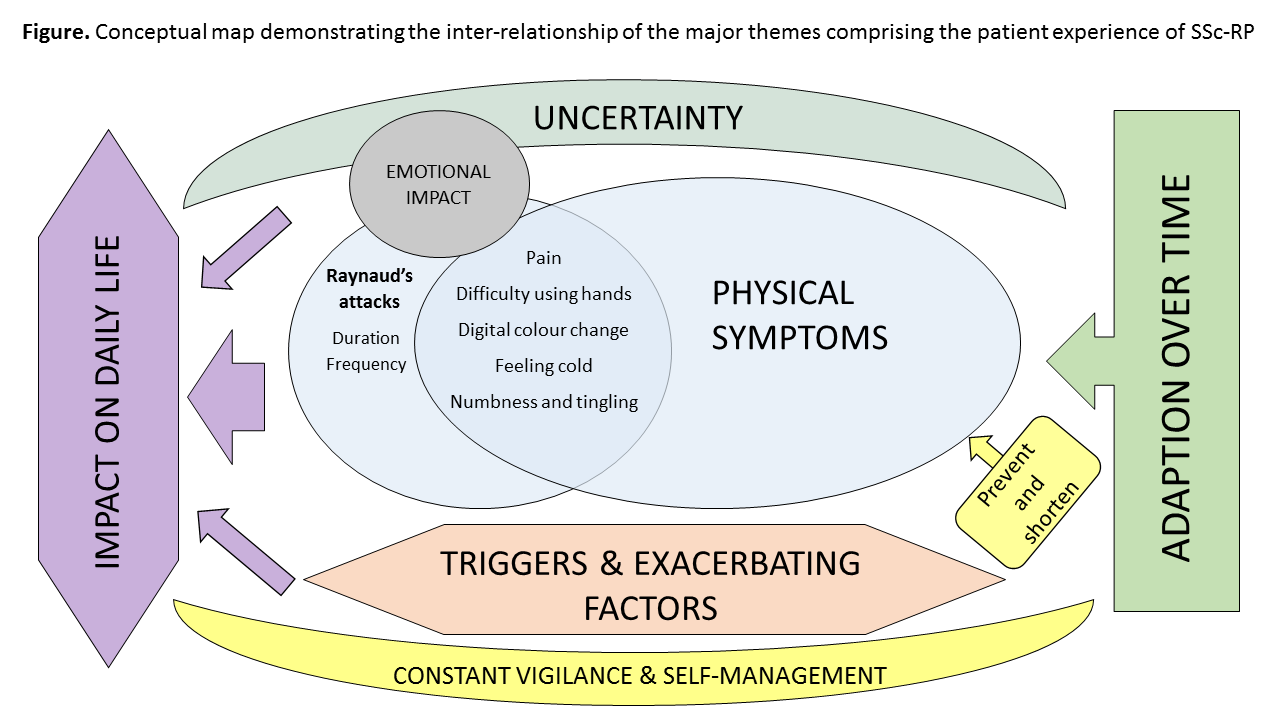Session Information
Date: Sunday, November 5, 2017
Title: Systemic Sclerosis, Fibrosing Syndromes and Raynaud's – Clinical Aspects and Therapeutics Poster I
Session Type: ACR Poster Session A
Session Time: 9:00AM-11:00AM
Background/Purpose:
Raynaud’s phenomenon (RP) is consistently ranked highest in patient surveys exploring the frequency and impact of disease related manifestations of systemic sclerosis (SSc). SSc-RP is an episodic phenomenon and not easily assessed in the clinical setting. A thorough understanding of the patient experience of SSc-RP is essential if severity and impact are to be captured using patient-reported outcome (PRO) instruments. We report the findings of an international qualitative research study to investigate the patient experience of SSc-RP.
Methods:
Focus groups (FGs) comprising patients with SSc-RP (fulfilling 2013 ACR/EULAR classification criteria) were conducted across 3 scleroderma centers in the United States and United Kingdom, using a topic guide devised by a steering committee comprising qualitative researchers, SSc patients and SSc experts. Participants were enrolled according to an a priori purposive sampling framework ensuring we sought the views of a diverse (geographic, cultural and ethnic) and representative (disease subtype, disease duration, gender and history of digital ulcer disease) cohort of SSc patients. FGs were audio recorded, transcribed, anonymised and analysed using inductive thematic analysis. Additional FGs were conducted until thematic saturation was achieved.
Results:
Forty SSc patients participated in 6 focus groups conducted in Bath (n=2), New Orleans (n=3) and Pittsburgh (n=1). The participant demographics are presented (Table). The patient experience of SSc-RP can be described according to 7 major inter-related themes comprising; physical symptoms, emotional impact, triggers & exacerbating factors, constant vigilance & self-management, impact on daily life, uncertainty and adaptation. A conceptual map demonstrating the inter-relationship of the 7 themes is presented (Figure).
Conclusion:
This is the first qualitative study to explore the patient experience of SSc-RP. The multi-center design and purposive sampling framework ensured experiences were obtained from a diverse and representative SSc cohort. SSc-RP comprises a complex interplay of experiences that result in significant physical/emotional distress, disability and altered social participation which adversely affects health-related quality of life. The themes (and subthemes) identified herein are not captured using existing PRO instruments for assessing SSc-RP. Work to develop a novel PRO instrument for assessing the severity and impact of SSc-RP, comprising domains/items grounded in the patient experience of SSc-RP identified in this work is now underway.
|
Demographics and clinical feature of enrolled patients presented according to purposive sampling framework |
|
|
Total number of participants: |
40 |
|
Disease subtype: |
|
|
limited |
24 |
|
diffuse |
16 |
|
Sex: |
|
|
Female |
34 |
|
Male |
6 |
|
Ethnicity: |
|
|
White/Caucasian |
26 |
|
Black/African-American |
12 |
|
Hispanic |
2 |
|
Disease duration (time since 1st non-Raynaud’s symptom) |
|
|
≥3 years |
34 |
|
<3 years |
6 |
|
History of DU disease: |
|
|
Yes |
23 |
|
No |
17 |
To cite this abstract in AMA style:
Pauling JD, Domsic RT, Saketkoo LA, Almeida C, Frech TM, Ingegnoli F, Withey J, Jay H, Dures E, Robson J, McHugh NJ, Herrick AL, Matucci-Cerinic M, Khanna D, Hewlett S. An International Qualitative Research Study Exploring the Patient Experience of Raynaud’s Phenomenon in Systemic Sclerosis [abstract]. Arthritis Rheumatol. 2017; 69 (suppl 10). https://acrabstracts.org/abstract/an-international-qualitative-research-study-exploring-the-patient-experience-of-raynauds-phenomenon-in-systemic-sclerosis/. Accessed .« Back to 2017 ACR/ARHP Annual Meeting
ACR Meeting Abstracts - https://acrabstracts.org/abstract/an-international-qualitative-research-study-exploring-the-patient-experience-of-raynauds-phenomenon-in-systemic-sclerosis/

